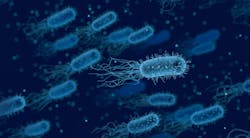A lab at Johns Hopkins University has reported that a specific protein, UshA, secreted by the pathogen Citrobacter rodentium during transient infections in mice causes genomic DNA damage in host cells and is associated with accelerated colon tumorigenesis, according to a news release from the School of Public Health.
“It has been generally believed that consistent and invasive bacterial infection and associated chronic inflammation drive tumor development; however, the impact of transient and noninvasive bacterial infection and associated acute inflammation remains elusive,” said Fengyi Wan, PhD, Associate Professor in Biochemistry and Molecular Biology.
“The beauty of symmetry promoted this line of research,” he said, “and the technical challenge in experimentally proving ‘hit and run’ theory in bacterially driven cancer development” guided the design.
“Hit and run” transient diarrheal diseases, such as those caused by enteropathogenic and enterohemorrhagic E. coli, known as EPEC and EHEC, are common, so understanding any potential connections to colon cancer is important, especially as the rates of colon cancer are rising globally.
The Wan lab began by testing whether transient infections could cause cancer-promoting DNA damage in a mouse model of infection using C. rodentium, which, like EPEC and EHEC, is an attaching/effacing pathogen, but unlike those human pathogens, it can infect mice.
Wan and other researchers found that C. rodentium infections caused DNA damage to the host cells, but only if the bacteria had a functional Type 3 Secretion System, which allows the bacteria to inject proteins directly into host cells.
To look at the impact of UshA and infection on later colon cancer development, the researchers infected mice that are prone to developing colon tumors with different strains of C. rodentium. All the mice completely cleared the infections in just a few weeks, but at three months post-infection, mice exposed to UshA-producing C. rodentium had higher levels of colon tumors than mice that were not infected or infected with engineered C. rodentium that didn’t make UshA.
The human pathogens EPEC and EHEC also have versions of UshA and the T3SS to inject it into host cells, and the Wan lab showed that they cause DNA damage to cultured cells, similar to C. rodentium. This study suggests that there may be a connection between these common, short-term, diarrheal illnesses and colon cancer in humans, but confirming those connections will require further research — and not just in the lab.

